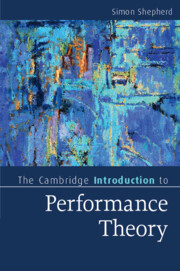Book contents
- Frontmatter
- Contents
- Preface
- Part I Definitions of performance
- Part II The emergence of performance as sensuous practice
- Part III Theorising performance
- 15 Performance, postmodernism and critical theory
- 16 What Performance Studies is: version 1: New York and Northwestern
- 17 What Performance Studies is: version 2: Oral interpretation
- 18 How Performance Studies emerged
- 19 Gender performativity
- 20 Performance and performativity
- 21 The relations between performance, theatre and text
- 22 The magic of performance
- Closing note
- References
- Index
- Cambridge Introductions to …
22 - The magic of performance
from Part III - Theorising performance
Published online by Cambridge University Press: 05 February 2016
- Frontmatter
- Contents
- Preface
- Part I Definitions of performance
- Part II The emergence of performance as sensuous practice
- Part III Theorising performance
- 15 Performance, postmodernism and critical theory
- 16 What Performance Studies is: version 1: New York and Northwestern
- 17 What Performance Studies is: version 2: Oral interpretation
- 18 How Performance Studies emerged
- 19 Gender performativity
- 20 Performance and performativity
- 21 The relations between performance, theatre and text
- 22 The magic of performance
- Closing note
- References
- Index
- Cambridge Introductions to …
Summary
To clarify the assumption as to how theory usually operates I want to take a minor detour. All sorts of texts could be cited to demonstrate the proper function of theory, but I have chosen one on the basis of its date and its subject field. It comes from 1970, not especially significant in itself, but early in the engagement between theatre and social science. Its subject area is not that of performances and texts, aesthetic or otherwise, but anthropology. And about the doing of anthropology it raises some questions that predate the wholesale absorption of anthropology into performance.
When, in 1970, Jairus Banaji reviewed the state of British anthropology he suggested its problem was the persistence of functionalism. In its post-war manifestation this took the form of analysis of intersubjectivity, as opposed to structure, as the object of study. Both modes of study were faulty, he argued, because they not only look at but also primarily value the ideas about themselves that people consciously hold. Approaches based in phenomenology may be similarly faulty. As modes of study they are not looking for that which is ‘unconscious’, defined as that which shapes the formation of conscious ideas: ‘The anthropologist's task is to penetrate a people's conscious representations, as embodied in their ideological productions (myth, ritual, marriage rules) and uncover a more fundamental, “unconscious reality”.’ This unconscious reality, or set of determinations, may well differ from those ideas which, although conscious, may nevertheless be illusory. Into this overall argument Banaji places, among others, Victor Turner, whom he sees, despite Turner's account of himself, as ‘functionalist’. His model of liminality is abstracted from particular historical circumstances, and is thus a ‘dehistoricised structure’. Furthermore it is a ‘conscious’ model (Banaji 1970: 75, 78). It reports on people's sense of what they are doing but it doesn't explore the deeper, unconscious, situation. So liminal process can feel consciously like change and mobility while in fact, in a way of which the participants are unaware, it functions as a mechanism for ensuring structural stability.
It is not, of course, just with anthropological work that one can see the distinction between conscious and unconscious modes of knowing. Back in that year when performance apparently entered the academy, 1979, …
- Type
- Chapter
- Information
- The Cambridge Introduction to Performance Theory , pp. 212 - 220Publisher: Cambridge University PressPrint publication year: 2016



